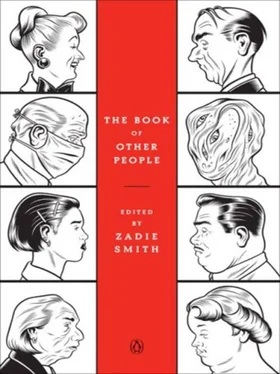In this way, Laziz accepted the burden of his inexperience. He developed a way of not caring about girls, by saying that he cared about girls.
And so when he was first and finally in bed with a girl, whose name was Nigora, on a business trip to Samarqand, Laziz was unprepared. He was also thirty-two.
Although both of them acknowledged that intercourse itself would not take place, there was still a tacit understanding that, since their clothes had been removed, other actions might be performed. There was an air of expectation. In Nigora’s mind, there was an idea of hopes to be fulfilled. But when Laziz’s fingers first felt the deep wetness of Nigora, its fur and unexpected sensations, he was not able to control himself. He spurted, a little to the left of Nigora, who was lying on her front.
At this point, Laziz felt his sex life running away from him .
How far is a person the same as their sex life? This was what Laziz began to think, naked, beside a naked girl. He became ontological, epistemological. Laziz wanted to believe that his sex life could be separate from his life. Like many people who have caused their own distress, he wanted to believe that events were not a sure guide to character – somewhere, inviolate, and far away from this scene, existed a Laziz who was powerful and perfect.
And yet events are a sure guide to character. Nigora, in the cake-shop queue, considering if she could leave Laziz, would have been able to tell him that. Our characters – she would have argued, sadly – are nothing but events. Everything else is only romance.
One proof of her improvised theory is what Laziz did next, in Namangan, many years ago, on that fateful night with Nigora.
He did not talk to Nigora; he did not tell the truth, and trust his charm. Instead, Laziz lay on his left side, with one hand propping up his head. A dying gladiator. He gazed at Nigora. He neglected to mention that he was lying on his own emission.
Nigora looked at him. And in this look began the subsequent relationship of Laziz and Nigora. For Laziz was trying to look cool and unconcerned; while Nigora was looking anxious. Laziz was hoping not to be found out; Nigora was fretting – why had her body, now naked, rendered Laziz so nonchalant, so lolling? Where was his fire? His inner spirit? Where was the lust?
The lust, thought Laziz, was simply premature. It was not on time. The lust would therefore return eventually. He was young and healthy, after all. And so he thought that the crisis would pass . He trusted to a timetable.
But the crisis did not pass. Leaning on his hand, Laziz continued to observe his new girlfriend in distress. His pose was classical. It was picturesque.
Oh, the picturesque is no substitute for lust! And yet the picturesque was all Laziz could perform; everything else was beyond him.
This image – in which Laziz was picturesque, leaning on his elbow, and Nigora was distressed, lying naked beside him – is the image of their subsequent marriage.
Two years later, succumbing to the pressure of events , they left their country (a country to which they would never return).
Some Night-time Dialogue between Nigora and Laziz
L It’s a dodgy haircut, isn’t it? It’s dodgy.
N Well, yes, you could say that. It’s dodgy.
L You think so?
N Well.
L Oh, no.
N I’m only teasing you; I’m only tormenting you.
L Tell me you love me.
N Lazizjon.
L Tell me you love me. Am I handsome? Tell me I’m handsome.
N You’re handsome. You’re more than handsome. You’re a looker.
L But you don’t mean that.
N Yes, I mean that.
L Well, you shouldn’t mean that.
N Lazizjon .
Each night, these facts recurred to her: Nigora was thirty-four; Yaha was twenty-three. These numbers were suddenly becoming fraught for Nigora. She remembered them every morning; at her rising up, and at her going to bed. She remembered them when she went out, and on her coming in.
She was a married woman. She did not know if she still loved her husband. She did not know if she, a married woman, whose hands and breasts – whose every opening – had since her marriage known only one man, was now in love with someone else.
Sometimes, Nigora believed that if she only kissed Yaha, then she would be cured. Her pain would be relieved. Cupid’s arrow would be removed from her breast. But she was not sure.
Nigora was a housewife and a part-time secretary. Yaha was a reserve footballer for AHLY.
As she spoke to her immortal and all-powerful God – a God she had disconsolately adopted from Laziz – she reasoned in this way. That she was not to blame. That so long as no sexual acts occurred she was not guilty of any sin. That the definition of a sexual act was problematic. That it necessarily included introduction of the penis into her body; and necessarily included ejaculation of semen, whether inside or outside a female body; and also, necessarily, any touch of a man’s hand or mouth on the bareness between her legs. But at this point Nigora grew perplexed. She felt the need for guidance, and could not find it.
Her problem was the kiss. She could not define the moral status of the kiss. If she kissed him, thought Nigora, then maybe she would not want to venture into the unambiguously immoral; she would no longer be tempted by the temptations of his flesh.
Since she thought that the kiss might be her cure, she tended to believe that a kiss was innocent. It was just on the right side of morality.
Nigora was not convinced of the soul’s immortality. Laziz was convinced; but she was not. And since she was not convinced, she was also unsure of his belief in crime and punishment. Without the threat of punishment or the promise of reward, her actions were oddly depleted. They existed only for her.
In this way, Nigora was a libertine.
All Nigora’s temptations were now refracted through the immortal. Her body’s immortal longings were her anxiety, her worry. They seemed more important than the possibility of her soul’s immortal life.
And yet, and yet. How much pleasure could her body procure, she wondered? If they slept together, she would not give Yaha pleasure; when he remembered her, she worried, he would remember her only with amusement, with pity. Her memory of passion would be his memory of the laughable.
At what point, she wondered, could she act out of character? When would she have the courage?
Her life was all Laziz: they could not contemplate themselves without each other. It was Laziz / Nigora; Nigora / Laziz; and Laziz bored her.
Laziz wore a baseball cap stitched with a Big Apple badge pinned to its peak. He wore khaki chinos with ironed-in pleating, like a curtain, around the crotch. Below the raised hem of these trousers, which did not reach his shoes, two sports socks were visible. These socks came in trios – three identical roll-mops – tightly in a plastic wrapper. He bought them from a kiosk in Downtown, which arranged its wares neatly outside on an ironing board. He wore a taupe and tucked-in polo neck, which in the language of the fashion magazines unread by Nigora would have been called unforgiving . On the fuzzy back-ledge of Laziz’s taxi were three miniature rubber dogs, with dislocated and nodding heads. There was a bulldog, a Scotch terrier and a (miniature) miniature Schnauzer.
Nigora had a theory of romantic comedy. It might, perhaps, have helped Laziz to know this theory. It might have helped him in his own thoughts and theories of marriage. But he did not know her theory.
Every plot in the movies (thought Nigora) was the same. She knew the plots. There was the life-changing moment. Then the meet-cute. Then the discovery of an obstruction to happiness. Then the decision to embark on a particular strategy. The test, or tests. The sudden reversal of the obstruction. And finally the happy ending.
Читать дальше












